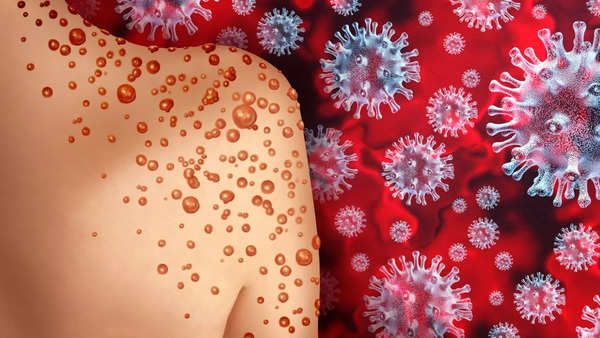Monkeypox types are classified into clades.The current outbreak which is declared as a global health emergency by WHO recently is triggered by Clade 1B, a deadlier strain of monkeypox as it is easier to spread through routine close contact.
Mpox usually shows up as rashes, flu-like symptoms and fever in most of the cases. However, in some cases, only rashes show up or in others fever and flu are more prominent with no rashes. Children and people with weakened immunity are at a greater risk of severe symptoms of mpox, as per WHO. It’s important to pay attention to early signs and symptoms of mpox in your child.
How Mpox spreads in children

Children and adolescents catch mpox infection through contact with infected people or animals or with contaminated materials. Skin-to-skin contact during cuddling, caregiving, or bed-sharing can spread mpox in kids.
It is also possible to transmit the virus across the placenta in utero or contact during the birthing process, contact with body fluids and respiratory secretions of patients with mpox or with contaminated fomites and sexual contact.
Symptoms usually start within 21 days of exposure to the virus, but can take 3 to 10 days to appear. Most people recover without treatment after a few weeks.
Here are 10 common symptoms of mpox in children parents need to watch out for:
Flu-like symptoms
Fever, muscle aches and sore throat are the initial symptoms that appear. Children can get it even from sharing clothes or towels, touching sores or prolonged skin-to-skin contact like hugging.
Chills and sweats
Flu-like symptoms can include chills and sweats accompanied by fever.
Rash
Children or adolescents are presented with a rash that appear on face first and then form in the entire body. It progresses from maculopapular lesions to vesicles, pustules, and finally scabs.
According to MMWR (Morbidity and Mortality Weekly Report) report, distribution of the rash in children was predominantly on the trunk and face and none of the children less than 12 years had rashes on genital organs or anogenital lesions. In contrast, most adolescents presented with anogenital lesions.
Fatigue and headache
People with mpox infection often report fatigue and headache.
Difficulty swallowing
This may occur when oropharyngeal lesions are present. They can appear on the lip, tongue, hard or soft palate, uvula, or floor of the mouth.
Eyelid swelling
Intraocular lesions, eyelid swelling, or eyelid crusting may occur when there are lesions near or in a patient’s eye. This can occur when a patient touches these sites with their hand after touching a lesion.
Back pain
Children with mpox also experience back pain. The symptoms usually appear within 5–21 days of exposure.
Low energy
Low energy or fatigue is a common symptom of mpox.
Joint pain
Some children may also experience joint pain post getting infected with mpox.
Swollen glands
Swollen lymph nodes, also known as lymphadenopathy or swollen glands are common in such infections and are a sign that your body’s immune system is working to fight infections, viruses, or bacteria.
Covid Done, New Virus Emerges: 100s Killed, WHO Declares Global Health Emergency | Mpox Explained






